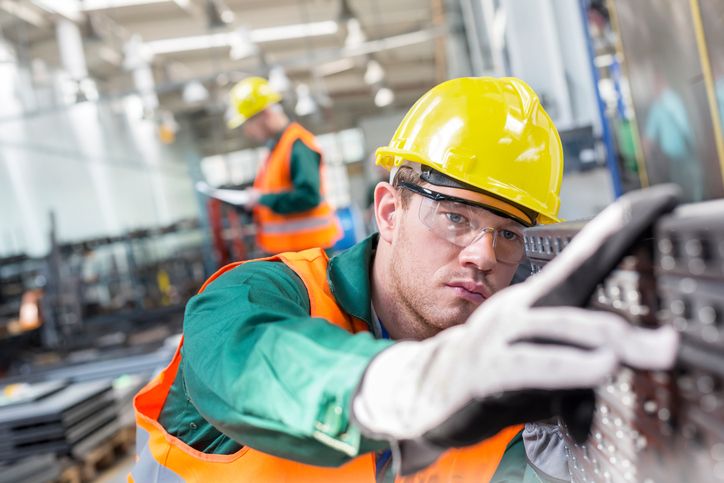 As manufacturing continues to change in profound ways, so too do the jobs and the skills required. Somewhere between the hands-on traditional blue collar jobs of the past and the white collar managerial roles is an emerging group of highly-skilled specialists that are redefining the American workforce.
As manufacturing continues to change in profound ways, so too do the jobs and the skills required. Somewhere between the hands-on traditional blue collar jobs of the past and the white collar managerial roles is an emerging group of highly-skilled specialists that are redefining the American workforce.
“It’s not about white collar or blue collar…It’s about ‘new collar’ jobs – jobs that are high-tech, 21st-century, rewarding, well-paying jobs – even those that don’t require a four-year degree,” said Jay Timmons, President and CEO of the National Association of Manufacturers, in his recent “State of Manufacturing” address.
Innovation is changing the way the industry looks, and while it may appear on the surface that jobs are going away, they’re shifting to roles that require new sets of skills, Timmons says. A study by Deloitte on the impact of automation on jobs in the U.K. found that while automation and AI technologies eliminated 800,000 low-skilled jobs over the course of more than a decade, it also created 3.5 million new ones that paid an average of nearly $13,000 more per year. And in the “automation alley” in Oakland County, Timmons noted more than 19,000 manufacturing jobs were created since the Great Recession.
“Innovation and automation are expanding what American workers can do, making the impossible possible and transforming this industry for the better.” – NAM CEO & President Jay Timmons
While the public often views automation as a threat to traditional manufacturing jobs, it is exactly what will grow the workforce, Timmons says. He believes the recent tax reform bill, which enables manufacturers to immediately write off the full cost of new equipment, will spur manufacturers to invest more in new equipment, automation and smart technologies.
“Automation and job creation are not at odds…. American workers and American technology are not enemies. Innovation and automation are expanding what American workers can do, making the impossible possible and transforming this industry for the better,” Timmons said.
Automation is creating new jobs in many areas of manufacturing, not only in service and management of robotics but also by enabling humans to become more efficient and help the company grow. While companies such as Tesla are moving towards full automation, many auto manufacturers say human workers will still be a key part of the process. Honda, which recently won the North American Car of the Year award at the Detroit auto show for the Accord, noted that humans are an essential component. An article in Bloomberg noted that Toyota and Mercedes Benz also rely more on humans than on robotics o install the increasingly complex options that consumers demand. Many manufacturers use robots for tedious and repetitive tasks such as welding and painting then rely on humans to install motors, interior trim and components.
“We can’t find anything to take the place of the human touch and of human senses like sight, hearing and smell,” Tom Shoupe, chief operating officer of Honda’s Ohio manufacturing unit, told Bloomberg.

Chief Executive Group exists to improve the performance of U.S. CEOs, senior executives and public-company directors, helping you grow your companies, build your communities and strengthen society. Learn more at chiefexecutivegroup.com.
0

1:00 - 5:00 pm
Over 70% of Executives Surveyed Agree: Many Strategic Planning Efforts Lack Systematic Approach Tips for Enhancing Your Strategic Planning Process
Executives expressed frustration with their current strategic planning process. Issues include:
Steve Rutan and Denise Harrison have put together an afternoon workshop that will provide the tools you need to address these concerns. They have worked with hundreds of executives to develop a systematic approach that will enable your team to make better decisions during strategic planning. Steve and Denise will walk you through exercises for prioritizing your lists and steps that will reset and reinvigorate your process. This will be a hands-on workshop that will enable you to think about your business as you use the tools that are being presented. If you are ready for a Strategic Planning tune-up, select this workshop in your registration form. The additional fee of $695 will be added to your total.

2:00 - 5:00 pm
Female leaders face the same issues all leaders do, but they often face additional challenges too. In this peer session, we will facilitate a discussion of best practices and how to overcome common barriers to help women leaders be more effective within and outside their organizations.
Limited space available.

10:30 - 5:00 pm
General’s Retreat at Hermitage Golf Course
Sponsored by UBS
General’s Retreat, built in 1986 with architect Gary Roger Baird, has been voted the “Best Golf Course in Nashville” and is a “must play” when visiting the Nashville, Tennessee area. With the beautiful setting along the Cumberland River, golfers of all capabilities will thoroughly enjoy the golf, scenery and hospitality.
The golf outing fee includes transportation to and from the hotel, greens/cart fees, use of practice facilities, and boxed lunch. The bus will leave the hotel at 10:30 am for a noon shotgun start and return to the hotel after the cocktail reception following the completion of the round.